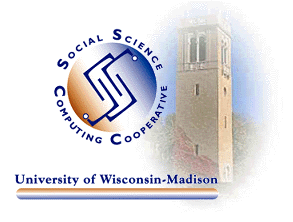
Worms, Viruses, and New Campus Policies
Protecting Your Home PC with a Router
New/Updated Software on Terminal Server
NVivo Available at Discounted Price
SAS Listserv Created
Tip: Protecting CDs from "CD Rot"
The UW campus (including the Social Science Building) continues to deal with the SASSER worm and other variants. Attacks on campus in the past year from viruses, worms, and denial-of-service attacks have significantly degraded campus network performance at times and even resulted in outages on parts of campus. (We experienced this firsthand on Wednesday.) In some cases, it was only a small number of PCs causing these major problems. As a result, a new policy on electronic devices connected to the UW-Madison network was put in place last month. The policy states that devices connected to the University of Wisconsin-Madison network must: 1) run up-to-date anti-virus software, 2) keep all operating system software, device firmware, application software and other software current with the latest security-related patches from the vendor. And, when DoIT identifies any infected device, it reserves the right to suspend access to preserve the integrity of the network. DoIT is actively enforcing this policy and even blocked Internet access to several PCs in the Social Science Building this week.
Anyone bringing a laptop or PC into the Social Science Building should first bring it to the SSCC Help Desk in Soc. Sci. 4315 prior to connecting it to the building network. We will check it and install any necessary updates/patches. This process usually takes about 30 minutes. SSCC's Help Desk is open 8-12, 1-4, Monday through Friday.
We created a lot of confusion in Wednesday's e-mail when we recommended that people buy a router for their home PCs and then gave no further explanation. Routers are network devices that are typically used in a home environment to connect two or more computers to the Internet. You can also use a router even if you only have one computer, as long as you make your Internet connection though DSL or a cable modem (not dial up). The reason we recommend a router as an additional security precaution is because routers usually come with a built in firewall between your modem and your computer. A firewall is used to protect your computer against outside attacks, and hardware firewall solutions (like those purchased with a router) require no or very little configuration. A quality Linksys router can be purchased at Best Buy or CompUSA for about $50.
Of course, your first line of defense should always be to keep your operating system updated (go to http://www.windowsupdate.com) and antivirus software installed and configured to automatically update your virus definition files on a regular basis. Antivirus software is free to the entire UW community and SSCC staff are happy to install it for you.
VPN users: A VPN connection is equivalent to bringing a laptop in the Social Science building and plugging it into the network. Therefore, it is extremely important that you keep your PC updated and patched. For more information on VPN, see SSCC Publication, 5-21, Connecting to the SSCC Network via VPN.
MLwiN 1.1 is now available on Winstat1 and Winstat2. MLwiN fits a a wide range of multilevel models including multivariate multilevel data, Markov Chain Monte Carlo modeling, discrete response data, multilevel generalized linear models, bootstrapping, cross classifications, and multiple membership models.
DBMSCopy has been upgraded to version 8 on Winstat1 and Winstat2. DBMSCopy, like Stat/Transfer, translates data from one format to another.
Through a new campus-wide site license arranged by the School of Education,
faculty, staff, and students can buy an individual copy of NVivo software from
QSR International for a discounted price of $116 per year. NVivo is used to
facilitate qualitative research projects and is becoming increasingly popular
with SSCC members. NVivo and N6, a similar product from QSR International, are
already available on terminal server (Winstat1 and Winstat2).
More information about the personal site license is available from the following
PDF file:
http://facstaff.wcer.wisc.edu/cthorn/University_of_Wisconsin_NVivo_License.pdf.
For more information about the software, visit QRS
International's web site.
A SAS listserv has been created as a forum for SAS programmers to share ideas, problems, etc. Occasional get-togethers will be announced as well. To subscribe, send e-mail to listar@ssc.wisc.edu with a blank subject line and the following text in the body of the message:
subscribe sasusers_sscc
E-mail Jane Smith in IRP for more information: jsmith@ssc.wisc.edu.
Remember when compact disks first appeared on the market and it was said that they were so invincible that they could last over 100 years? Well, now the industry is dealing with "CD rot." There's a very interesting article on CNN's web page about this problem, and anyone who uses CD for data archiving should definitely read it. The article also includes the following advice for protecting your CDs:
1. Handle discs by the outer edge or the center hole.
2. Use a felt-tip permanent marker to mark the label side of a CD.
3. Keep discs clean. Wipe with cotton fabric in a straight line from the center
of the disc toward the outer edge.
4. Return discs to their plastic cases immediately after use.
5. Store discs upright (book style) in their cases.
6. Store discs in a cool, dry, dark place with clean air.
7. Open a recordable disc package only when you are ready to record.
8. Check the disc surface before recording.
Data librarians would further recommend that you make more than one archival copy of important data and that you copy it to new media periodically. Nothing lasts forever!
Go to previous editions of
SSCC News.
Go to the SSCC Home Page.
© 2004 University of Wisconsin Social Science Computing Cooperative